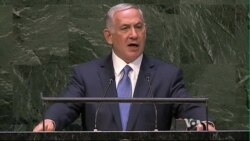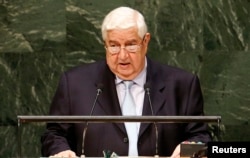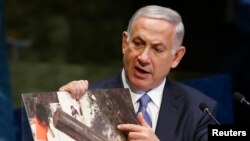Israel’s prime minister urged the international community not to allow Iran to develop its nuclear capabilities, and tied the Jewish state's fight against Hamas militants in the Gaza Strip to the larger global fight against Islamic State militants.
Israeli leader Benjamin Netanyahu said militant Islam is on the march all over the world. He warned that groups, such as Islamic State, seek global domination.
He criticized countries who have supported U.S.-led efforts to crush ISIS, as the group is also known, for not supporting Israel in its own recent 50-day war against Hamas militants who indiscriminately fire rockets into Israel from Gaza.
"They evidently don’t understand that ISIS and Hamas are branches of the same poisonous tree," he said. "ISIS and Hamas share a fanatical creed, which they both seek to impose well beyond the territory under their control.”
Netanyahu also urged the international community not to sign a nuclear deal with Iran allowing it continue enriching some uranium.
“Make no mistake, ISIS must be defeated," he said. "But to defeat ISIS and leave Iran as a threshold nuclear power is to win the battle and lose the war.”
He warned that once Iran has the capacity to produce nuclear bombs, all the charms and smiles of the Iranian leadership will quickly disappear. Netanyahu said there is only one course of action and that is to fully dismantle Iran’s nuclear military capabilities.
Syria & Fight Against Terror
The Syrian foreign minister, Walid al-Moallem, also addressed the U.N. General Assembly Monday on the fight against terror.
He said Islamic State is the most dangerous terrorist organization in the world in terms of funding and brutality.
“Once again, the Syrian Arab Republic reiterates that it stands with any international effort aimed at fighting and combating terrorism, he said.”
But he accused the United States of having a "dual policy" on anti-government militants in his country by fighting some and supporting others.
Referring to anti-government groups seen as moderate by Washington, he said backing them creates what he called "fertile ground" for the continued growth of extremism in the region.
He urged that pressure be exerted on countries who have joined the U.S.-led coalition to end their support of armed groups. Damascus has repeatedly accused Gulf Arab states of supporting the armed opposition in Syria - which the regime characterizes as terrorists.
Peace talks stalled
Peace talks in Geneva between the regime and opposition representatives broke down earlier this year. Minister Moallem said the Assad government wants a political solution and is working with a “real opposition,” but did not indicate when or how talks might resume.
Last year, the minister’s speech was delivered weeks after hundreds of civilians were killed in a chemical attack in the city of Ghouta that the West blamed on Syria's government. Since then, the government has given up its chemical arsenal under the orders of the U.N. Security Council, an achievement that Minister Moallem underscored to the Assembly.
A dual front against IS
Now in its fourth year of a deadly civil war, Syria is one of two fronts where a U.S.-led coalition is bombing extremist militants in an effort to push them back.
Kurdish local militias in northern Syria continued to clash with Islamic State forces on Monday, defending the town of Kobane, also known as Ain al-Arab, near the Turkish border.
The fighting has created an exodus of Syrian Kurds into Turkey, which has strengthened its military presence on the border.
The U.S. Central Command said Sunday and Monday's strikes in Syria hit targets near Aleppo, near Raqqa, near Manbij and in Deir el Zour. The strikes hit Islamic State vehicles, an anti-aircraft artillery transport, two compounds, a training camp and a grain storage facility. The United Arab Emirates and Jordan participated in the latest round of coalition attacks.
In Iraq, the U.S. military said three airstrikes hit IS vehicles near Kirkuk, Sinjar and elsewhere in the country's northwest.
Underestimating IS
U.S. President Barack Obama says the United States "underestimated" the rise of Islamic State and other Syrian-based militants, and "overestimated" Iraq's ability to fight them.
Obama told CBS television's 60 Minutes Sunday it is a myth that if the United States had armed the moderate Syrian rebels two years ago, as some in Washington urged, Syria would be fine today.
The president blamed the situation in Iraq, in part, on former prime minister Nouri al-Maliki. Obama said the prime minister squandered an opportunity to unify the country and showed more interest in consolidating Shi'ite support than forming a unity government with the Sunnis and Kurds.







